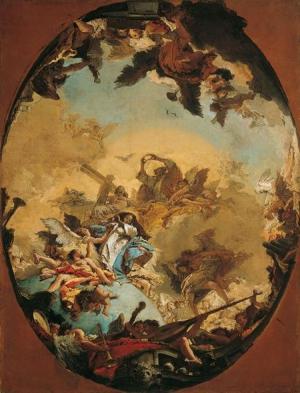Marietta: A Maid of Venice
Nonfiction, Religion & Spirituality, New Age, History, Fiction & Literature| Author: | Francis Marion Crawford | ISBN: | 9781465534392 |
| Publisher: | Library of Alexandria | Publication: | March 8, 2015 |
| Imprint: | Language: | English |
| Author: | Francis Marion Crawford |
| ISBN: | 9781465534392 |
| Publisher: | Library of Alexandria |
| Publication: | March 8, 2015 |
| Imprint: | |
| Language: | English |
Very little was known about George, the Dalmatian, and the servants in the house of Angelo Beroviero, as well as the workmen of the latter's glass furnace, called him Zorzi, distrusted him, suggested that he was probably a heretic, and did not hide their suspicion that he was in love with the master's only daughter, Marietta. All these matters were against him, and people wondered why old Angelo kept the waif in his service, since he would have engaged any one out of a hundred young fellows of Murano, all belonging to the almost noble caste of the glass-workers, all good Christians, all trustworthy, and all ready to promise that the lovely Marietta should never make the slightest impression upon their respectfully petrified hearts. But Angelo had not been accustomed to consider what his neighbours might think of him or his doings, and most of his neighbours and friends abstained with singular unanimity from thrusting their opinions upon him. For this, there were three reasons: he was very rich, he was the greatest living artist in working glass, and he was of a choleric temper. He confessed the latter fault with great humility to the curate of San Piero each year in Lent, but he would never admit it to any one else. Indeed, if any of his family ever suggested that he was somewhat hasty, he flew into such an ungovernable rage in proving the contrary that it was scarcely wise to stay in the house while the fit lasted. Marietta alone was safe. As for her brothers, though the elder was nearly forty years old, it was not long since his father had given him a box on the ears which made him see simultaneously all the colours of all the glasses ever made in Murano before or since. It is true that Giovanni had timidly asked to be told one of the secrets for making fine red glass which old Angelo had learned long ago from old Paolo Godi of Pergola, the famous chemist; and these secrets were all carefully written out in the elaborate character of the late fifteenth century, and Angelo kept the manuscript in an iron box, under his own bed, and wore the key on a small silver chain at his neck.
Very little was known about George, the Dalmatian, and the servants in the house of Angelo Beroviero, as well as the workmen of the latter's glass furnace, called him Zorzi, distrusted him, suggested that he was probably a heretic, and did not hide their suspicion that he was in love with the master's only daughter, Marietta. All these matters were against him, and people wondered why old Angelo kept the waif in his service, since he would have engaged any one out of a hundred young fellows of Murano, all belonging to the almost noble caste of the glass-workers, all good Christians, all trustworthy, and all ready to promise that the lovely Marietta should never make the slightest impression upon their respectfully petrified hearts. But Angelo had not been accustomed to consider what his neighbours might think of him or his doings, and most of his neighbours and friends abstained with singular unanimity from thrusting their opinions upon him. For this, there were three reasons: he was very rich, he was the greatest living artist in working glass, and he was of a choleric temper. He confessed the latter fault with great humility to the curate of San Piero each year in Lent, but he would never admit it to any one else. Indeed, if any of his family ever suggested that he was somewhat hasty, he flew into such an ungovernable rage in proving the contrary that it was scarcely wise to stay in the house while the fit lasted. Marietta alone was safe. As for her brothers, though the elder was nearly forty years old, it was not long since his father had given him a box on the ears which made him see simultaneously all the colours of all the glasses ever made in Murano before or since. It is true that Giovanni had timidly asked to be told one of the secrets for making fine red glass which old Angelo had learned long ago from old Paolo Godi of Pergola, the famous chemist; and these secrets were all carefully written out in the elaborate character of the late fifteenth century, and Angelo kept the manuscript in an iron box, under his own bed, and wore the key on a small silver chain at his neck.















